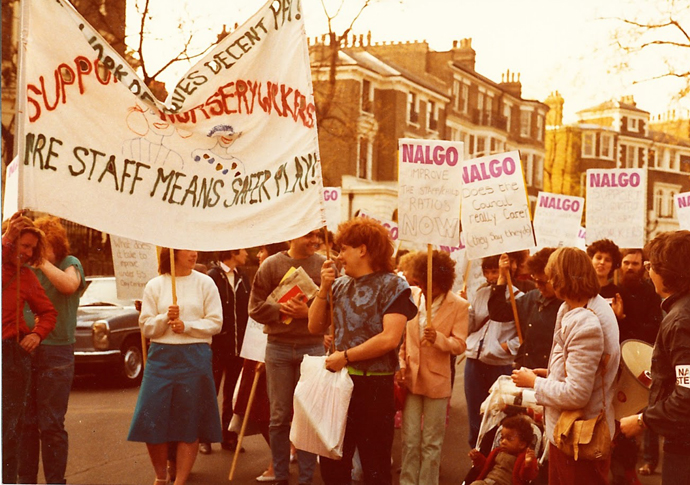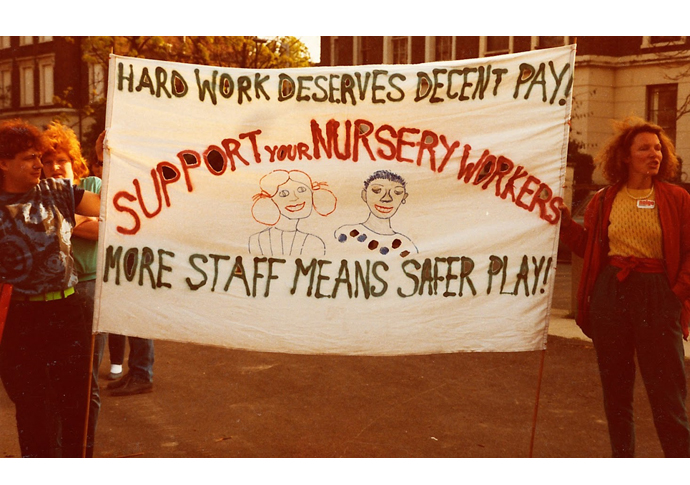‘It was a long struggle’
Forty years ago nursery workers took on the Town Hall in a dispute over pay. Now an oral history project is set to speak to some of those involved, writes Dan Carrier
Friday, 23rd February 2024 — By Dan Carrier

More than 150 nursery workers – predominantly women – walked out on indefinite strike in what was a groundbreaking dispute
IT was 40 years ago when low-paid nursery staff decided they had had enough of broken promises and walked out on indefinite strike.
And now the story of how 155 of the borough’s lowest paid workers won a battle with the Town Hall to ensure youngsters were properly cared for is at the centre of a new oral history project.
Historic England announced this week that Caledonian Road-based history group On The Record has won a grant of £12,500 to gather the stories of people – predominantly women – involved in a groundbreaking dispute which improved the lives of hundreds of Islington toddlers.
Oral historian Rosa Schling set up On The Record in 2012 with her colleague Laura Mitchison.
She told the Tribune: “We have been doing work around the history of childcare in London through a number of different projects, and mapping the grassroots activities around childcare since the 1960s. The work of early years practitioners and childcare workers is often undervalued and historically overlooked.”
In 1982 Islington had elected a left-wing Labour council which had promised in its manifesto to provide more funding for nursery places and improve pay and conditions for staff.
Workers said they had too many children to look after and there was never cover for anyone who had a day off for a course or was unwell.

Striking nursery workers spell out their demands
Ms Schling said: “Staff could find themselves heavily outnumbered – and the staff were some of the worst-paid workers in the council.”
When the council backtracked on their promises, the workers put in a pay claim in 1983.
She said: “Until then, most of the nursery workers were not in a trade union – and this dispute saw them come together and join NALGO to fight the council.”
The 13 council-run nurseries were closed while other community-run nurseries also closed in solidarity.
Ms Schling said: “They said they needed an extra 75 staff recruited to bring down the ratios between teachers and pupils to a sensible level. It was a long struggle.”
By the end of the dispute, the council agreed to improve their pay and conditions and recruited an extra 26 staff. It brought the number down to four-and-half children per adult.
Ms Schling said: “I am in touch with people who were on strike at the time, people who were the organisers. We are reaching out for people who remember the dispute. That could be staff, council workers, parents who had children in nurseries. Parents were very supportive, they joined picket lines and even helped occupy the Town Hall for a day in protest.”

Rosa Schling
Participants will co-create the outcomes, which could take the form of a podcast, a piece of theatre for radio or an audio walk linking the nursery sites.
And the project holds lessons for today, with the same battles being fought, explains Ms Schling.
She said: “This is about also getting people concerned with childcare issues today involved. It is so important people know about the various ways people have taken action to create a better system in the past. The childcare system today is not as good as it should be.
“It is really expensive. The government is about to bring about an expansion of childcare but it isn’t available for everyone. It isn’t universal and is seen as unworkable by nurseries themselves.
“We still have a long way to go before we have an affordable childcare system and have childcare workers who are properly valued in the way they should be.”
And the plans would see workers being asked to care for more children than they currently do, with a ratio of one adult to every five two-year-olds.
Ms Schling added: “Childcare workers are some of the lowest paid workers in the country. A lot of them do not even earn the minimum wage, and for those living in Islington the cost is extremely high.
“You can earn better money doing something else but these are the people we entrust our children with at such an important stage of their development. It is a highly skilled job and completely undervalued.”